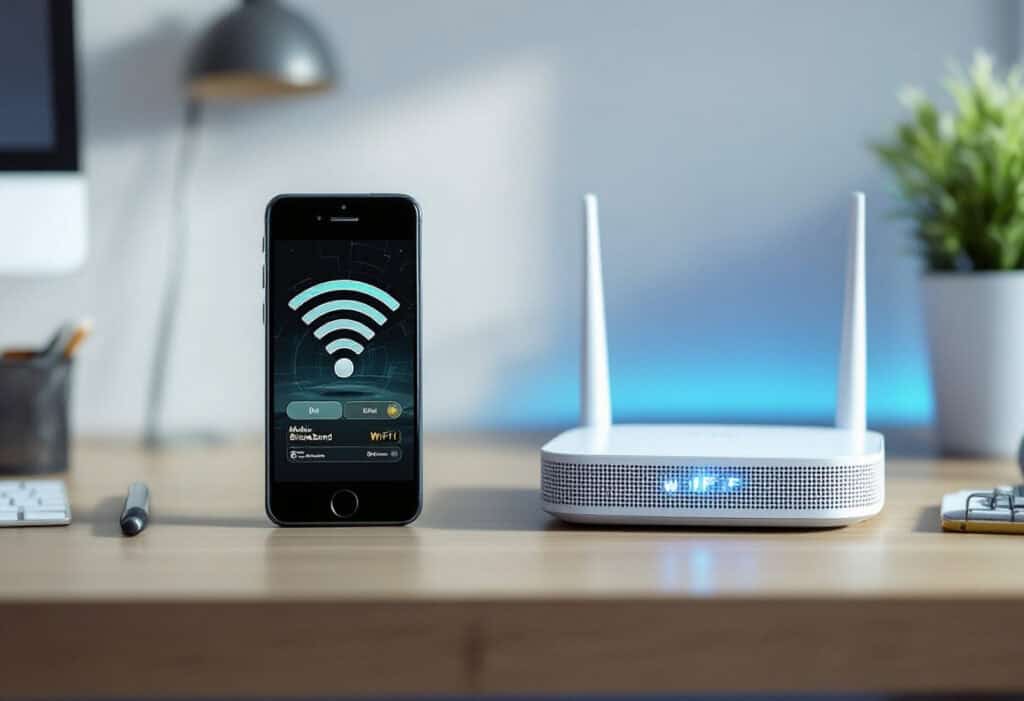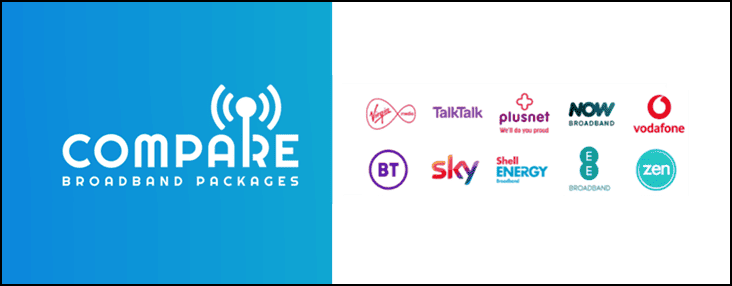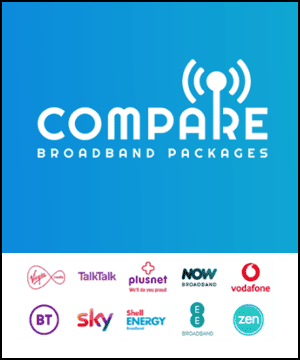
Listen to Our Podcast Overview of This Article Below
With so many internet connectivity options, it can be challenging to determine which one is best suited to your requirements. Mobile broadband and Wi-Fi are two popular choices, each with its unique set of advantages and benefits. To make an informed decision, it’s crucial to understand the differences between the two.
Mobile broadband utilizes a cellular network to provide internet connectivity. On the other hand, Wi-Fi uses radio waves to transmit data through a wireless network. Understanding the distinction between the two options can help you determine which one is right for you.
When considering mobile broadband vs WiFi, various factors come into play, including speed, coverage, and data usage. Mobile internet is convenient and portable, enabling you to connect on the go. Wi-Fi, on the other hand, offers wider coverage and can be more cost-effective in certain situations.
We’ll explore the pros and cons of both mobile broadband and Wi-Fi connections. By examining their advantages and disadvantages, we hope to provide you with the information needed to choose the best mobile broadband deals, or wi-fi to suit your needs.
Key Takeaways
- Mobile broadband and Wi-Fi are two popular internet connectivity options.
- Mobile broadband utilizes a cellular network, while Wi-Fi uses radio waves to transmit data through a wireless network.
- Factors to consider when choosing between mobile broadband and Wi-Fi include speed, coverage, and data usage.
What is Mobile Broadband?
Mobile broadband is a type of cellular internet connection using wireless networks rather than fixed-line connections. It is accessible through devices such as mobile phones, laptops, and tablets, allowing you to stay connected while on the go.
Three Broadband

No Landline No Problem – Unlimited Data
✅ Renters or frequent movers: No installation = no landlord headaches.
✅ Rural users: If fibre hasn’t reached you, Three’s 4G/5G can be a lifeline.
✅ Temp setups: Think pop-up shops, festivals, or backup internet.
The advantages of mobile broadband are vast, with one of the main benefits being its speed. With fast download and upload times, mobile broadband saves time and enhances productivity.
Mobile broadband plans typically come in different data allowances, giving users the flexibility to choose a plan that suits their usage requirements. Whether you need a small data allowance for light browsing or a larger allowance for streaming, there is a plan for you.
In addition to being quick and flexible, mobile broadband offers the convenience of being portable. With no need for cables or wires, you can access the internet from anywhere at any time.
Overall, mobile broadband is an excellent choice for those on the go who require fast and flexible internet access. With various plans to choose from and portable devices to connect to, you can easily stay connected wherever you are.
What is Wi-Fi?
If you are reading this article, you are likely familiar with Wi-Fi. It is a wireless technology that allows you to connect to the internet without the need for physical cables. Wi-Fi networks are widely available in homes, businesses, and public spaces, providing access to the internet wherever you go.
The benefits of Wi-Fi are numerous. One of the main advantages is its wide coverage, which allows you to stay connected throughout a building or even an outdoor area. This makes it ideal for working, studying, or streaming media on multiple devices. Additionally, Wi-Fi is often faster than mobile data connections, enabling you to access the internet more quickly.
One factor to consider in comparing Wi-Fi and mobile data usage is data consumption. Wi-Fi networks do not use up your mobile data allocation, which can be particularly important if you have a limited data plan. However, it is important to note that Wi-Fi networks can be less secure than mobile data connections. Always ensure you connect to secure Wi-Fi networks to protect your data.
Advantages of Mobile Broadband
Mobile broadband offers a range of benefits that make it a convenient choice for internet connectivity. One of the primary advantages is its speed capability, which is typically faster than traditional Wi-Fi connections. With speeds up to 90Mbps, mobile broadband allows you to easily stream high-quality videos and music.
Another advantage of mobile broadband is its portability. As long as you have a mobile signal, you can connect to the internet from virtually anywhere. This makes it an ideal option for those who are always on the go, such as business travellers or remote workers.
| Plan | Speed | Data Allowance | Price |
|---|---|---|---|
| Starter | 30Mbps | 5GB | £10/month |
| Standard | 60Mbps | 15GB | £20/month |
| Premium | 90Mbps | 30GB | £30/month |
In addition to its speed and portability, mobile broadband plans offer a variety of options to suit your needs. Depending on your usage, you can choose a plan with a higher or lower data allowance, ensuring you only pay for what you need.
Overall, mobile broadband is a versatile and efficient solution for internet connectivity, providing fast speeds, portability, and flexible plans to fit your usage requirements.
Benefits of Wi-Fi
If you’re looking for a reliable and cost-effective way to connect your devices to the internet, Wi-Fi is an excellent option to consider. Here are some of the key benefits:
- Wi-Fi coverage: Wi-Fi networks offer expansive coverage, allowing you to connect to the internet from a variety of locations within the network’s range. This means you can access the internet on your laptop or mobile device from the comfort of your home or office, and even from public hotspots such as cafes and airports.
- Wi-Fi versus mobile data usage: Wi-Fi connections are generally much faster than mobile data connections, allowing you to download and stream content quickly and without interruption. Additionally, using Wi-Fi to connect your devices to the internet helps conserve your mobile data allowance, ultimately saving you money on your bill.
By taking advantage of the benefits that Wi-Fi offers, you can enhance your internet experience and enjoy fast and reliable connectivity wherever you go.
Comparing Mobile Broadband and Wi-Fi
Now that you have explored the advantages of both mobile broadband and Wi-Fi, it’s time to compare the two options. While they may seem similar at first glance, there are some key differences to consider.
The main difference between mobile broadband and Wi-Fi is that mobile broadband connects to the internet through a cellular network, while Wi-Fi connects through a wireless network. This means that mobile broadband is available wherever there is cellular coverage, whereas Wi-Fi is limited to the range of the wireless network.
In terms of speed, mobile broadband can be faster than Wi-Fi, especially if you have a strong cellular signal. However, Wi-Fi networks can often provide more consistent speeds, as they are not affected by network congestion in the same way that cellular networks can be.

Another factor to consider is data usage. While both mobile broadband and Wi-Fi can be used to access the internet, mobile broadband plans often have data limits or usage caps, while Wi-Fi is typically unlimited. If you tend to use a lot of data, Wi-Fi may be the better option for you.
Ultimately, the choice between mobile broadband and Wi-Fi comes down to your individual needs and preferences. If you need internet connectivity while on the go or in areas without Wi-Fi coverage, mobile broadband may be the better option. However, if you are primarily using the internet in areas with reliable Wi-Fi coverage, Wi-Fi is likely the way to go.
Exploring Mobile Home Broadband: Benefits and Drawbacks
Mobile home broadband has increasingly become a viable option for those seeking internet connectivity without the constraints of traditional fixed-line services. Here’s a closer look at its advantages and disadvantages.
Three Broadband

No Landline No Problem – Unlimited Data
✅ Renters or frequent movers: No installation = no landlord headaches.
✅ Rural users: If fibre hasn’t reached you, Three’s 4G/5G can be a lifeline.
✅ Temp setups: Think pop-up shops, festivals, or backup internet.
Advantages of Mobile Home Broadband
- Portability and Flexibility: Enjoy internet access wherever you go, without being tied down by location. This flexibility is ideal for those who move frequently or have transient living situations.
- Cost-Effective Setup: Say goodbye to hefty installation fees and restrictive long-term contracts. Mobile broadband typically offers a more straightforward setup process.
- Potential Speed Benefits: In certain regions, mobile broadband can surpass traditional broadband in speed, offering a more efficient internet experience.
Disadvantages of Mobile Home Broadband
- Reliability Concerns: While mobile broadband can be fast, it often struggles with consistent reliability. Users may experience slower speeds and disruptions.
- Coverage Limitations: Due to its reliance on mobile networks, availability can be patchy. Some areas might not have coverage, or users might experience limited service.
- Interference Issues: Signal strength is subject to environmental factors, making it vulnerable to interference, which can lead to occasional dropouts and reduced service quality.
By weighing these factors, you can determine if mobile home broadband fits your internet needs and lifestyle.
Closing Words
After exploring the pros and cons of mobile broadband and Wi-Fi connections, you now have a comprehensive understanding of the benefits and drawbacks of each option. By comparing factors such as speed, coverage, and data usage, you can determine which one suits your connectivity needs best.
Mobile broadband offers a convenient and portable solution with varying plans to meet your requirements. It delivers high-speed internet connectivity on the go, making it ideal for individuals who need to stay connected wherever they are.
On the other hand, Wi-Fi provides comprehensive coverage with unlimited data usage, making it perfect for larger households or businesses. Its reliable network connections ensure uninterrupted internet connectivity, allowing you to enjoy streaming, browsing, and gaming without any disruptions.
FAQ’S
What is the difference between mobile broadband and Wi-Fi?
What is the difference between mobile broadband and Wi-Fi?
Mobile broadband refers to internet connectivity provided through mobile networks, while Wi-Fi is a local wireless network that allows devices to connect to the internet. Mobile broadband relies on cellular towers to provide coverage, while Wi-Fi requires a router to create a network within a specific area.
Understanding Mobile vs. Home Broadband
While both mobile and Wi-Fi are critical components of modern connectivity, it’s vital to understand the distinction between mobile broadband and home broadband.
- Fixed-line Home Broadband: This type of broadband uses a physical line, such as copper or fibre optic cables, to connect your home to the internet. It is generally faster, more reliable, and widely available. This makes it ideal for households with high data demands and those needing stable connectivity, like for streaming or gaming.
- Mobile Broadband (4G/5G): In contrast, mobile broadband leverages mobile phone networks to provide internet access. It offers flexibility, allowing users to connect on the go. In some rural areas, where traditional fixed-line broadband may be limited, mobile broadband can even provide faster speeds.
By understanding these differences, you can make informed decisions about the internet connectivity that best suits your lifestyle and location needs.
What are the advantages of mobile broadband?
Mobile broadband offers the advantage of being portable, allowing you to connect to the internet from anywhere with a cellular signal. It also provides consistent access to the internet, even in areas without Wi-Fi coverage. Additionally, mobile broadband plans often offer high-speed data options, allowing for faster browsing and downloads.
How does mobile broadband speed compare to Wi-Fi?
Mobile broadband internet speeds can vary depending on the network signal strength and the specific plan you have. In general, Wi-Fi connections tend to be faster, especially if you have a high-speed internet service at home or in the location where the Wi-Fi network is set up.
Do mobile broadband plans have data limitations like Wi-Fi networks?
Yes, mobile broadband plans typically have data limitations similar to Wi-Fi networks. However, some mobile broadband plans offer unlimited data options, allowing you to browse and stream without worrying about exceeding your data limit.
Can I use both mobile broadband and Wi-Fi on the same device?
Yes, most devices are capable of connecting to both mobile broadband networks and Wi-Fi networks. This allows you to switch between the two options based on your location and the availability of an internet connection.
Is mobile broadband the same as wifi?
Mobile broadband and WiFi are not the same thing. Mobile broadband refers to the high-speed internet access that one can get on a mobile device, such as a smartphone or tablet, through a broadband cellular network.
On the other hand, WiFi is a wireless networking technology that allows devices to connect to the internet through a wireless router. While both technologies provide internet access, they operate in different ways and offer different benefits and limitations.
Is mobile wifi better than broadband
Mobile WiFi can be a convenient option for those who need internet on the go. It offers flexibility and portability, but may not always provide the same speed and reliability as traditional broadband. Consider your needs and usage habits before deciding if mobile WiFi is better than broadband for you.
How good is mobile broadband?
Mobile broadband, known for its convenience and flexibility, is a popular choice for individuals looking to stay connected on the go. The speed and reliability of mobile broadband networks have improved significantly in recent years, making it a viable option for many users.
The answer to the question on how good mobile broadband is, would likely vary depending on the specific location and service provider. Overall, mobile broadband in English-speaking countries tends to offer decent coverage and fast speeds for browsing, streaming, and downloading.
What is mobile broadband?
Mobile broadband refers to wireless internet access provided through a mobile device, such as a smartphone or tablet. It allows users to connect to the internet on the go, using cellular networks to access data and information.
Mobile broadband enables you to browse the web, stream videos, send emails, and engage in other online activities while away from a fixed location.
What is a mobile broadband device?
A mobile broadband device is a portable device that allows users to connect to the internet wirelessly. It uses cellular network technology to provide internet access on-the-go, similar to how a smartphone accesses the internet.
These devices typically come in the form of USB dongles, mobile hotspots, or embedded mobile broadband modems in laptops or tablets. Users can simply plug in the device or turn it on to access the internet from anywhere with a strong cellular signal.
What is wifi broadband?
Wifi broadband is a type of high-speed internet connection that allows users to wirelessly connect to the internet using a router. In simple terms, wifi broadband is a technology that enables devices such as smartphones, laptops, and tablets to access the internet without the need for physical cables.
What is the best portable wifi router?
The best portable WiFi router in my opinion is the TP-Link AC750 Wireless Portable Nano Travel Router. It offers fast speeds, a compact design, and easy setup, making it ideal for travellers or those on-the-go. It also includes multiple modes for versatility and secure VPN access for increased privacy.
Is mobile broadband secure?
Yes, mobile broadband is generally considered secure. Providers use encryption technology to protect data transmitted over the network. However, users should still take precautions such as using strong passwords and avoiding public Wi-Fi networks to further safeguard their information.
What is integrated mobile broadband?
Integrated mobile broadband refers to the capability of a device to connect to the internet using a built-in mobile broadband modem. This allows users to access the internet on-the-go without the need for external dongles or hotspots. Integrated mobile broadband is commonly found in laptops, tablets, and smartphones.
What is the best mobile wifi dongle uk?
I think the Huawei E8372 is a great pick. It offers fast 4G speeds and a reliable connection on the go. With easy setup and compatibility with all major networks, it’s the perfect choice for staying connected wherever you go.
While dedicated mobile broadband devices offer convenience, using your smartphone’s built-in hotspot feature (tethering) is another option. This uses your phone’s mobile data connection to create a Wi-Fi network for other devices.
If you’re considering this, especially if you own an Android phone, it’s recommended that you check the best reviews for Android devices regarding hotspot performance and battery life, as tethering can be demanding on your phone’s resources.
What are the advantages of mobile broadband?
Mobile broadband provides flexibility in internet access, allowing users to connect from various locations. It can also offer higher speeds in certain areas, particularly in rural regions where traditional infrastructure may be lacking.
How do the performance characteristics differ between the two?
Fixed-line broadband typically offers higher speeds, greater reliability, and broader availability compared to mobile broadband connections.
What infrastructure is used for each type of broadband?
Fixed-line broadband connects homes to the internet using physical cables, such as copper or fibre optics. In contrast, mobile broadband utilizes cellular networks, specifically 4G or 5G, to deliver internet access.










